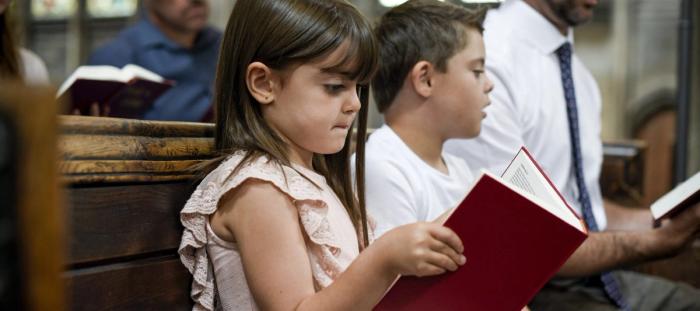When the last black car has pulled out of the cemetery and all the salads have been cleared from the reception, when the condolences and cards stop coming and the bouquets are taken down, how do you sit with the grief that’s left behind?
Death is strange. It’s so common and—literally—unavoidable, and yet it feels foreign. Although most societies have cultural structures in place to guide the grieving, grief itself often lasts far longer than we can account for.
Christians like to bolster those who mourn with the promise that we will see believing loved ones again, that we can have joy even in sadness! And though these truths are real and powerfully comforting, they can’t replace what is now missing in our lives. They don’t stop the pang of sorrow when you set two places at the table before remembering you only need one; they don’t quench the desire to share your day with someone no longer around to hear about it; they don’t stop the ache—which can last for years—to find connection in the familiar face of someone who is gone.
Perhaps you have been among those in whom grief nests long after a loved one has passed, and you have wondered, “Am I allowed to still be sad?” As Christians who are called to rejoice always, who rest in the unshakeable hope of the resurrection, maybe you, too, have asked, “How long am I allowed to grieve?”
Although it’s both good and worthwhile to seek counseling or pastoral care if you feel overwhelmed or in despair over the passing of a loved one—or for help managing anger, bitterness, or resentment that might come in the wake of a death—grief itself is an appropriate response to loss.
We Live in a Cursed World
We know that God made the world good (Gen. 1:31). The earth pours forth the glory of a God who has designed for us a paradise in which to live. However, we also know that this world is currently under a curse, broken and bent by the burden of corruption, decay, and death (Gen. 3:17–19)—all brought about by sin in our first father, Adam (Gen. 2:16–17, 3:17–19).
Humans are the crown of this good creation, made in the very image of the infinite God, brought to life by his very breath, crowned with glory and honor (Gen. 1:27, 2:7; Ps. 8:5). Humans are compared with the angels (Ps. 8:5), and God made us to be rulers and guardians, holy and righteous (Eph. 4:24). But because of Adam’s sin, we return to dust. We were not made to die, and yet death takes us all.
Mourning is Natural and Biblical
Knowing this glorious truth about the origins of humanity, Christians of all people should understand the depth of woe and despair when the grave swallows up those we love. We should feel this curse deeply. We, more so than those who do not have the revealed word of God and know of his eternal plans for humankind, should understand the extent to which death is the enemy. So, though we can mourn with hope, we do mourn.
Scripture does not put a limit on how long we should feel the effects of the curse. Rather, it tells us to come alongside those who are sitting in sorrow (Rom. 12:15). It says, “Blessed are those who mourn, for they shall be comforted” (Matt. 5:4). Even Jesus wept, moved by the powerful reach of death (John 11:35). If you find yourself spilling tears over a tombstone, you are in holy company.
Death is the Final Enemy to be Destroyed
Christ came to conquer death (1 Cor. 15:25–26). The immortal God took on human flesh that he might redeem us from the power of the curse by becoming a curse on our behalf (Gal. 3:13) and so break its crushing hold on life. He tasted the bitter sting of the grave and he rose over it, victorious (1 Cor. 15:56–57). He was a better Adam (Rom. 5:14; 1 Cor. 15:45), and just as he is from heaven, so shall be those who belong to him (1 Cor. 15:48).
Because Christ lived in perfect obedience to God and died in that same perfection, he has conquered death—because he rose again, he has assured our resurrection as well:
So is it with the resurrection of the dead. What is sown is perishable; what is raised is imperishable. It is sown in dishonor; it is raised in glory. It is sown in weakness; it is raised in power. (1 Cor 15:42–43)
Take these words of hope and hold them close—they are the words of God for you. If you and those you love die in the arms of Christ, you will see them again. But do not let this stop short your period of mourning, however long that may be. Take comfort from the ache of grief because it speaks to the eternity set upon our hearts. It points our souls forward to the day when we will be together in the life to come, when death has been swallowed up in victory and God himself will wipe away our tears.






